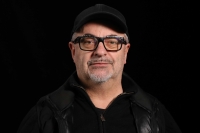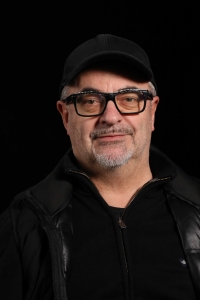They told us, “This is no time for fun.”

Download image
Luboš Rychvalský, a chef who ran teahouses and restaurants, was born on 11 April 1964 in Karlovy Vary. He studied at the Secondary Technical Construction School in Loket and from the time of his secondary school studies he was involved in Karlovy Vary’s alternative cultural life. He used to meet people involved in the local theatre and organize happenings. After finishing his military service at the construction unit at Ruzyně (1984-1986), he settled in Prague, where he worked as a stoker in the Botanical Garden, and later as a prop man at Czechoslovak Television. In the second half of the 1980s he obtained a travel permit and travelled to Morocco, where he gained experience in local kitchens and cooked Czech cuisine himself at various events. However, he broke the thirty-day validity period of the permit, so he faced police persecution after his return. When he refused to cooperate with State Security, his passport was confiscated. In the following months he worked as a night watchman in Žižkov in Prague and published the samizdat magazine Jazzstop. Thanks to the help of the Committee for the Defence of the Unjustly Prosecuted (VONS), he could get a lawyer and in January 1989 the court fined him 2000 CZK, which he paid with the help of the Committee. On May Day 1989, together with the actress Bára Štěpánová and the evangelical theologian Peter Payne, they founded the recessionist Society for the Merrier Present (Společnost pro veselejší současnost, SVS). Their first continuous happening was a run along Political Prisoners´ Street (Politických vězňů) under the slogan Today we run for you, tomorrow you will run for us. Dozens of people participated in the runs every day. Other happenings included, for example, a demonstration on boats on the Vltava River, a “police intervention” by the recessionist Merry Security against a silent demonstration in Na Příkopě Street, or the launching of a model of a whale on the Vltava River on the eve of the anniversary of the invasion of the Warsaw Pact troops on 20 August 1989. The project of establishing a museum of totalitarianism in the village of Bezpráví [“injustice” in Czech, trans.], planned for several months, ended with the laying of the foundation stone on 10 December 1989. Luboš Rychvalský took part in the demonstration in National Street on 17 November 1989, where he voluntarily got into a police van (this was also meant to be another happening). In the following days, by printing leaflets, he unintentionally participated in spreading of the false information about the death of Martin Šmíd, a student. He had received this information directly from Drahomíra Dražská. On New Year’s Eve 1989, at the party hosted by the Havel couple at a Smíchov culture centre, he ran an oriental tea room, which inspired him to start a business in the 1990s: he founded a chain of Good Tea Shops across the country.

